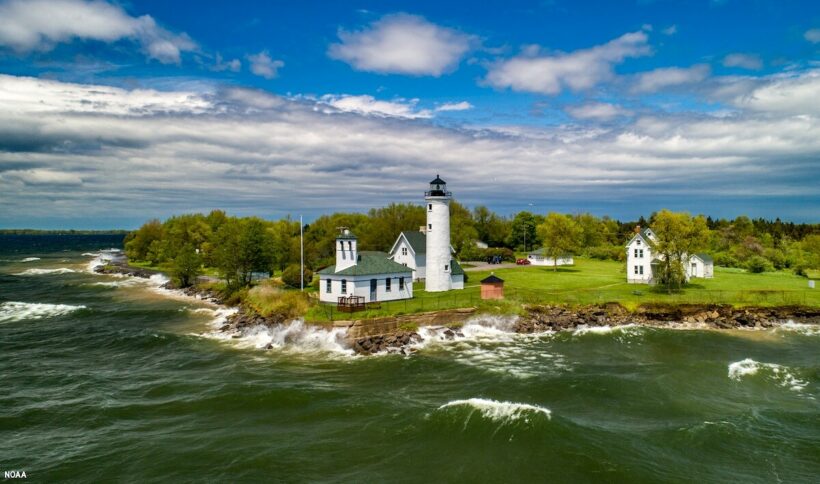The United States National Oceanic and Atmospheric Administration (NOAA) has announced the designation of the 1,722-square-mile Lake Ontario National Marine Sanctuary in eastern Lake Ontario, New York.
By: Cristen Hemingway Jaynes
It is the country’s 16th national marine sanctuary and will celebrate the area’s Indigenous and maritime history while providing new opportunities for education, research, recreation and tourism related to maritime heritage in coastal communities, a press release from NOAA said.
“President Biden is leading the most ambitious conservation agenda in history through the America the Beautiful Initiative, and today’s marine sanctuary designation is another key milestone in that effort,” said Brenda Mallory, chair of the White House council on environmental quality, in the press release. “For generations to come, families will be able to learn about our nation’s maritime history and the rich cultural heritage of Lake Ontario.”
America the Beautiful has a goal of conserving, protecting or restoring a minimum of 30 percent of lands and waters in the U.S. by 2030. President Joe Biden has set aside more than 41 million acres for conservation.
“The designation of this sanctuary is a milestone for NOAA, New York and the nation. Establishing a national marine sanctuary in the cold fresh waters of eastern Lake Ontario opens the door to world-class research and education initiatives, and provides opportunities to support and enhance tourism and the local economy within one of the most historically significant regions in the Great Lakes,” said Rick Spinrad, NOAA administrator, in the press release.
The waters and coastline of Eastern Lake Ontario hold a diverse heritage and history, including trade routes and transportation, beginning with early Indigenous settlements.
The marine sanctuary features a collection of 41 found shipwrecks and a submerged aircraft that is one of the world’s best preserved.

Map of known and potential wreck locations (approximate) within Lake Ontario National Marine Sanctuary. NOAA
“The shipwrecks, such as St. Peter, a three-masted schooner that was loaded with coal when it was lost in a storm in 1898, embody more than two centuries of the nation’s maritime history,” the NOAA press release said.
Another three aircraft, 19 shipwrecks and other archaeological sites may still be located in the area, according to historical records, a press release from the National Marine Sanctuary Foundation said.
NOAA will further locate, monitor and research the discoveries, as well as other cultural resources of maritime history. NOAA will also partner with Indigenous governments and other local partners to promote education and outreach.
“From sacred places and cultural practices to lighthouses and historic shipwrecks, this region’s maritime cultural legacy provides meaning and a sense of place to countless generations,” said Nicole R. LeBoeuf, director of the National Ocean Service, in the NOAA press release. “NOAA looks forward to working with a wide range of partners to learn, share and celebrate the remarkable history of the eastern Lake Ontario region.”
Nomination for the sanctuary was made by a group of organizations that included the Onondaga Nation, museums, conservation, recreation, education and tourism groups, historical societies and local government units.
Portions of the homelands of the Cayuga, Seneca, Onondaga and Oneida Nations lie within the boundaries of the sanctuary.
“NOAA acknowledges and respects that eastern Lake Ontario is of cultural, spiritual and historical significance to the Nations of the Haudenosaunee Confederacy, who have been stewards of their homelands for thousands of years and continue to care for these lands and waters,” said John Armor, director of the Office of National Marine Sanctuaries, in the NOAA press release. “We are dedicated to building equitable partnerships with Indigenous Peoples in the stewardship of these waters.”
The sanctuary will be co-managed by New York State and NOAA. It is the third marine sanctuary in the Great Lakes and the first in New York.
“The designation of Lake Ontario National Marine Sanctuary ensures that this bustling, vibrant, and historic part of the state of New York will be recognized as one of the most iconic U.S. waters, alongside vast expanses of the Pacific, the vibrant deep of the Gulf of Mexico, the reefs of the Florida Keys,” said Joel Johnson, president and CEO of the National Marine Sanctuary Foundation, in a press release from the foundation. “This announcement creates new opportunities for education on American and Tribal history, outdoor recreation and exploration for New Yorkers and for all Americans.”
On September 6 at 11 a.m., there will be an event to celebrate the new sanctuary at William S. Cahill Pier in Oswego, New York. For more information, visit the sanctuary’s website.
Cristen is a writer of fiction and nonfiction. She holds a JD and an Ocean & Coastal Law Certificate from University of Oregon School of Law and an MA in Creative Writing from Birkbeck, University of London. She is the author of the short story collection The Smallest of Entryways, as well as the travel biography, Ernest’s Way: An International Journey Through Hemingway’s Life.










